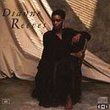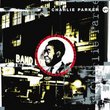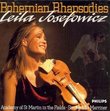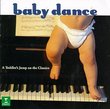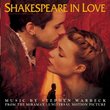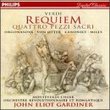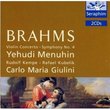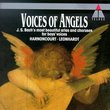| All Artists: Ludwig van Beethoven, Wilhelm Furtwangler, Orchester der Bayeuther Festspiele, Elisabeth Schwarzkopf, Otto Edelmann, Hans Hopf, Elisabeth Hongen, Chor der Bayeuther Festspiele Title: Beethoven - Symphony no. 9 'Choral' / Furtwängler, Schwarzkopf, Höngen, Hopf, Edelmann (Great Recordings of The Century) Members Wishing: 0 Total Copies: 0 Label: EMI Classics Original Release Date: 1/1/1951 Re-Release Date: 1/12/1999 Album Type: Original recording remastered Genre: Classical Styles: Forms & Genres, Symphonies, Historical Periods, Classical (c.1770-1830), Modern, 20th, & 21st Century, Symphonies Number of Discs: 1 SwapaCD Credits: 1 UPCs: 724356695320, 724356695351 |
Search - Ludwig van Beethoven, Wilhelm Furtwangler, Orchester der Bayeuther Festspiele :: Beethoven - Symphony no. 9 'Choral' / Furtwängler, Schwarzkopf, Höngen, Hopf, Edelmann (Great Recordings of The Century)
 | Ludwig van Beethoven, Wilhelm Furtwangler, Orchester der Bayeuther Festspiele Beethoven - Symphony no. 9 'Choral' / Furtwängler, Schwarzkopf, Höngen, Hopf, Edelmann (Great Recordings of The Century) Genre: Classical
No single performance will ever tell us everything we need to know about a masterpiece like the Beethoven Ninth, but this one comes close. The inspired intensity of everyone involved--at the postwar reopening of the Bayreu... more » |
Larger Image |
CD DetailsSynopsis
Amazon.com essential recording No single performance will ever tell us everything we need to know about a masterpiece like the Beethoven Ninth, but this one comes close. The inspired intensity of everyone involved--at the postwar reopening of the Bayreuth Festival in 1951--comes across very vividly in this new transfer. Just hear the way Furtwángler evokes the atmosphere of chaos coalescing into order at the opening of the first movement and you can tell a superior musical and spiritual consciousness is at work. Except for the poor first horn, whose bloopers are the main detriment, the orchestra, soloists, and chorus (recorded clearly but at a heavenly distance) all hold up their parts extremely well. The solo singers are particularly convincing. This is a very special recording, recognized as a classic when it was first issued and still indispensable. --Leslie Gerber Similarly Requested CDs
|
CD ReviewsMagnificent! Jeffrey Lipscomb | Sacramento, CA United States | 06/07/2004 (5 out of 5 stars) "I first heard this magnificent Beethoven 9th in the early 1970's on a poor Seraphim LP transfer, never dreaming it could sound as good as it does here. That first hearing turned my entire view of great orchestral interpretation upside down. Previously, I had felt that Toscanini's was the finest interpretation. But by the time I reached the first mvt. coda of this live 9th from Bayreuth, my perceptions of musical eloquence had been changed forever. I simply had no idea of what power, breadth, majesty, grandeur and originality this music contained until I heard Furtwangler. This is one of about 10 Beethoven 9th recordings by Furtwangler, all of them "live." They are all fascinating. There is a general consensus that Furtwangler's three finest readings are this one, the 1942 BPO from Berlin, and the 1954 Philharmonia from Lucerne. Here is a summary: 1. This Furtwangler (1951) with the Bayreuth Festival Orchestra & Chorus (Schwarzkopf, Hongen, Hopf, & Edelmann). It is less extreme than the 1942 and has more energy and passion than the 1954. Schwarzkopf is superb, Edelmann is excellent. The other Furtwangler 9ths listed here are better played (no wavering horn player in the Adagio), but this one has a special sense of occasion that makes it unique. The CD transfer here is identical to the one in the complete Beethoven set on EMI. So if you already have that one, there is no need to buy this one. 2. Furtwangler/BPO 1942, Bruno Kittel Choir, with Tilla Briem, Elisabeth Hongen, Peter Anders, and Rudolph Watzke (Music & Arts CD 4049). This is the most impassioned and dramatic of ALL 9ths. The BPO plays as if possessed, and the singers (except for Briem's shaky high notes) are superb. This is a performance of huge extremes: I feel the 1951 Bayreuth is perhaps the better balance of mind and heart. Furtwangler only conducted the 9th on special occasions. Likewise, this intensely anguished reading should only be heard every once in a while. 3. Furtwangler/Philharmonia 1954, Lucerne Festival Chorus, with Schwarzkopf, Elsa Cavelti, Ernst Haefliger, and Edelmann (best transfer is on Tahra 1054/7). Just 3 months before his death, Furtwangler is slower and more meditative. Wonderfully weighty and profound, this 9th lacks some of the fire and energy of the 1951 Bayreuth. This was the conductor's own favorite of all his live 9ths - and there are times when I feel it is his greatest reading. Frankly, I wouldn't want to be without any of them. While there are other interpretations that I also admire (Abendroth, Weingartner, Schuricht, and Konwitschny), this Furtwangler threesome represents my favorite readings of all. There are times when I feel that 1942 Berlin is ultimate, but then I hear this Bayreuth and the Lucerne and I waver. Each of these has special insights and profoundly communicative playing. You really owe it to yourself to hear them - they are among the richest musical experiences you will ever encounter." The atmosphere of a great occasion. John Austin | Kangaroo Ground, Australia | 03/17/2001 (5 out of 5 stars) "Now 50 years old, this recording, reissued many times, is likely to have outsold all other recorded versions of this symphony. It carries the atmosphere of a great occasion recorded live - the post war re-opening of the Bayreuth Festspiehaus in 1951. The performance itself, for all its occasional imperfections, has the headlong spontaneity of a first performance. The sound quality in this latest reissue is perfectly acceptable. The wonderful acoustics of Wagner's Bayreuth theatre help ensure success. You might be aware that you are sometimes carried in too closely to one or two woodwind instruments during the third movement, but the perspective is otherwise consistent. The taxing vocal contributions are never disappointing, Elisabeth Schwarzkopf's singing being especially distinctive. I have never heard any performer make any "feel good" statements about this symphony. Toscanini, who conducted it countless times during his long life, declared that he never got to understand it. Orchestra members complain that they feel they have been reduced to "accompaniment" status once the baritone begins his recitative in the last movement. A retired contralto soloist who performed it all around the world once told me, "It's a bugger, John. I still go weak at the knees when I hear the introduction to the last movement." Sopranos singing in the chorus report that the high notes they need to attack and sustain leave them hoarse and exhausted afterwards. Can other internet visitors offer further performing insights?" Incandescent cdsullivan@massed.net | Cambridge, MA USA | 10/22/2000 (5 out of 5 stars) "No one could call this 1951 performance of Beethoven's glorious 9th Symphony perfect. Some of the orchestral playing is uneven, the sound is rough and some of the singing is flawed. But, despite these technical flaws, what this recording achieves emotionally is beyond belief.First and foremost is the indescribably inspired, unbelievably moving conducting of Wilhelm Furtwängler, the greatest conductor of the twentieth century. He infuses every bar with enormous warmth and majestic radiance, while holding his huge forces together flawlessly. His interpretation has an otherworldly, Olympian quality, particularly in the hushed serenity of the third movement and the exhilaration of the fourth movement, while remaining perfectly warm and human. Even by his standards, this is an outstanding performance. With the exception of the first horn, the Bayreuth Festival Orchestra plays magnificently, fully up to communicating Furtwängler's vision of this piece. Even the first horn, who bungles his entry in the third movement, contributes some elegant, beautiful phrasing. In the final movement, the chorus and solo quartet are generally excellent. Standing out even from this excellence is the radiant voice of Elisabeth Schwarzkopf, here at her most straightforward peak. She redeems a slightly choppy first line with some sublime singing toward the end of the movement. Her high B's there are some of the most beautiful sounds I have ever heard. The contralto, Elisabeth Höngen, is not on this level. She is rather uneven throughout her part, but her voice is beautiful enough. Hans Hopf is an excellent tenor, with a juicy, ringing voice, and Otto Edelmann is a firm-voiced, resonant bass. The chorus sings excellently.Some people may find the sound too primitive for comfort. The chorus in the last scene is placed rather too far back (though this at least enables the orchestra to be heard); with heavy surface noise in addition to the audience's display of respiratory ailments, this will definitely not be for those people who must have crystal-clear, silent digital sound. For me, though, these "flaws" are almost welcome. They show that this a live recording; they give a sense of occasion, of white-hot inspiration, that I find far preferable to the cold studio glare of many modern recordings. I have three other recordings (Klemperer [1957], Karajan [1977] and Davis [1993]), and only Klemperer gets anywhere near this performance. So while this performance may not be perfect technically, it shows us the soul of this magnificent work in a way no other recording approaches; and for me, that is the most important aspect of a recording. This is one of the greatest recordings ever made of anything, and will never be even remotely approached."
|

 Track Listings (4) - Disc #1
Track Listings (4) - Disc #1